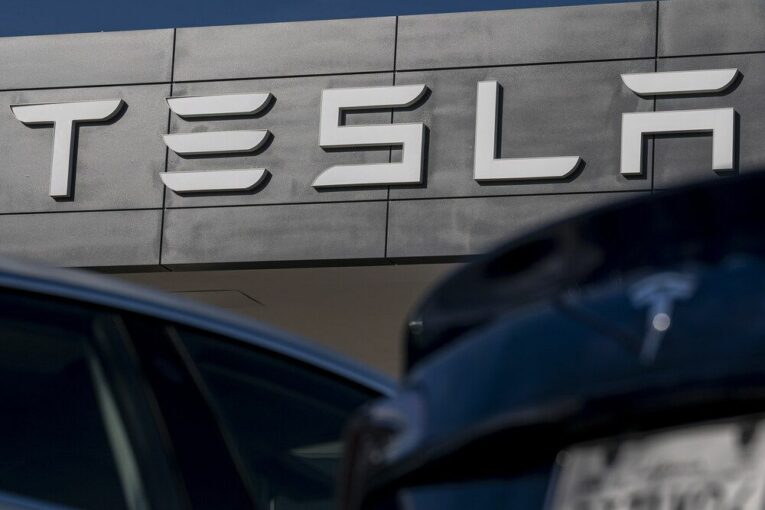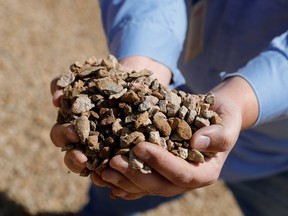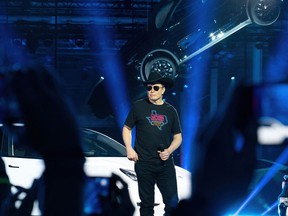
As billionaire technology mogul Elon Musk entertained the masses with a plan to buy Twitter Inc., one his companies was making plans to expand its team in Canada so it can tap into the country’s vast mineral resources.
Earlier this month, Tesla Inc., the electric vehicle maker that is responsible for most of Musk’s fortune, posted a job opening on LinkedIn for a senior policy associate who would be located in Toronto and focused on the critical minerals supply chain.
The successful applicant will help Tesla source its critical minerals, suggesting that a major consumer of the metals needed for the energy transition sees Canada as a potential solution to supply challenges. The position appears to come with a lobbying component, as the posting says the role also includes “policy, regulatory and advocacy work,” and policy development around battery supply chains and sustainable energy, in addition to electric and autonomous vehicles.
“Are you passionate about accelerating the world’s transition to sustainable energy?” Iain Myrans, the company’s national senior manager of public policy and business development in Canada, posted on LinkedIn earlier this month.
“The successful candidate will have an opportunity to help shape public policy across North America (and beyond) related to supply chain, responsible sourcing, critical minerals, and electric and autonomous vehicles,” Myrans added.
Neither Myrans nor Tesla were available to comment by the time of publication.

The job posting arrives weeks after the federal government released a budget that allocates billions of dollars towards developing a critical minerals supply chain to feed the growing electric-vehicle industry and transition away from fossil fuels. The initiatives include: $1.5 billion for new infrastructure investments to develop new mineral projects in critical regions; $1.5 billion for mineral processing, materials manufacturing and recycling for key mineral and metal products in the battery and rare-earths supply chain; a 30-per-cent tax credit for investment in mineral exploration companies searching for critical minerals including battery metals; and hundreds of millions of dollars in additional funding for research and development of new technology, and for exploration related to critical minerals used in electric vehicle batteries.
Tesla has not disclosed any plans to produce vehicles or batteries at an industrial scale in Canada. However, it has long looked to the country to bolster various aspects of its business. Perhaps most famously, for the past five years, Dalhousie University’s Jeff Dahn, Canada Research Chair in Materials for Advanced Batteries, has filed patents on the company’s behalf related to battery-cell technology.
In 2017, Tesla hired Myrans, a principal adviser for climate change and director of policy in Ontario’s Ministry of Environment and Climate Change from 2014 to 2017, to lead its public policy, government affairs and stakeholder relations work in Canada.

Myrans wrote on his LinkedIn bio that he helped design and implement “Ontario’s first price on carbon, the first legislated 2030 GHG reduction target in Canada and the establishment of Ontario’s climate action plan.”
In 2019, the company purchased Richmond Hill, Ont.-based Hibar Systems Ltd., which specializes in building “complex high speed integrated battery assembly lines,” and it has continued to expand its footprint and business connections throughout the country.
Earlier this year, Myrans marked his fifth anniversary at the company with a list of his accomplishments, writing on Linkedin, “we have over 200,000 square feet of manufacturing operations at two locations in the Toronto area and three R&D locations in Canada.”
But the expansion of its policy team in Toronto shows that the world’s most famous electric vehicle company may also see an expanding role for Canada as a source of critical minerals.
“Tesla is an energy company first, and a car company second,” said Flavio Volpe, president of the Automotive Parts Manufacturers’ Association, a lobby group. “And I say that respectfully.”
Volpe said he believes that Tesla’s energy storage business — which includes three main products, solar panels, its Powerwall and PowerPack storage devices for homes and businesses, and MegaPack a utility scale storage unit — will provide a key source of growth in the years ahead.
Tesla is an energy company first, and a car company second
Flavio Volpe
But securing metals to build its products will be key to its success as other automakers expand their electric vehicle offerings, Volpe said. Earlier this year, the company reportedly signed a deal with Brazilian miner Vale S.A. to source nickel from its Canadian mines.
For the new job opening in Toronto, the company is looking for someone with experience in industry or government related to critical minerals strategy, battery supply chain management and responsible sourcing who understands the legislative and regulatory framework in Canada at both the federal and provincial level.
• Email: [email protected] | Twitter: GabeFriedz
_____________________________________________________________
If you liked this story, sign up for more in the FP Energy newsletter.
______________________________________________________________
You can read more of the news on source
